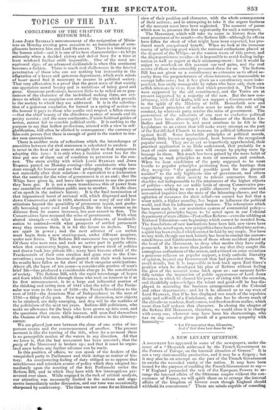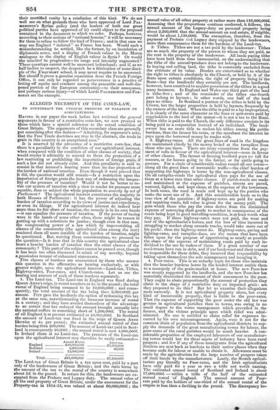A NEW LEVANT QUESTION.
A DOCUMENT has appeared in some of the newspapers, under the name of a " Despatch addressed by the French Government to the Powers of Europe, on the internal situation of Greece." It is not a very statesmanlike production, and it may be a forgery ; but it may also be an attempt on the part of the -French Government to soothe the wounded vanity of the nation. It may have been issued for the purpose of enabling the French Government to say- " If England persuaded the rest of the European Powers to ar- range the internal affairs of the Ottoman empire without the con- currence of France, we will spirit them on to arrange the internal affairs of the kingdom of Greece even though England should withhold its concurrence." There are minds capable of consoling
their mortified vanity by a retaliation of this kind. We do not well see on what grounds those who have approved of Lord PAL- MERSTON'S Syrian policy (and the leaders of both our great political parties have approved of it) could object to the proposal contained in the document to which we refer. Perhaps, however, according to their notions of " national honour," it will be necessary for them to refuse to follow the lead of France ; and in that case we may see England " isolated" as France has been. Would such a misunderstanding be settled, like the former, by an inundation of diplomatic notes, and a display of French valour in the Morea analogous to the display of English valour in Syria ? Or would the mischief be progressive—its range and intensity augmented ? These questions cannot well be answered beforehand ; and if, as we half incline to suspect, the despatch be a fabrication of some disci- ple of the PRQUIPART school, it may never require to be answered. But should it prove a genuine emanation from the French Foreign Office, it can only be regarded as perseverance in a practice of letting off squibs and crackers among the peaceable and well-dis- posed portion of the European community—to their annoyance, and perhaps serious injury—of which Lords PALMERSTON and PON- BONET set the example.



























 Previous page
Previous page